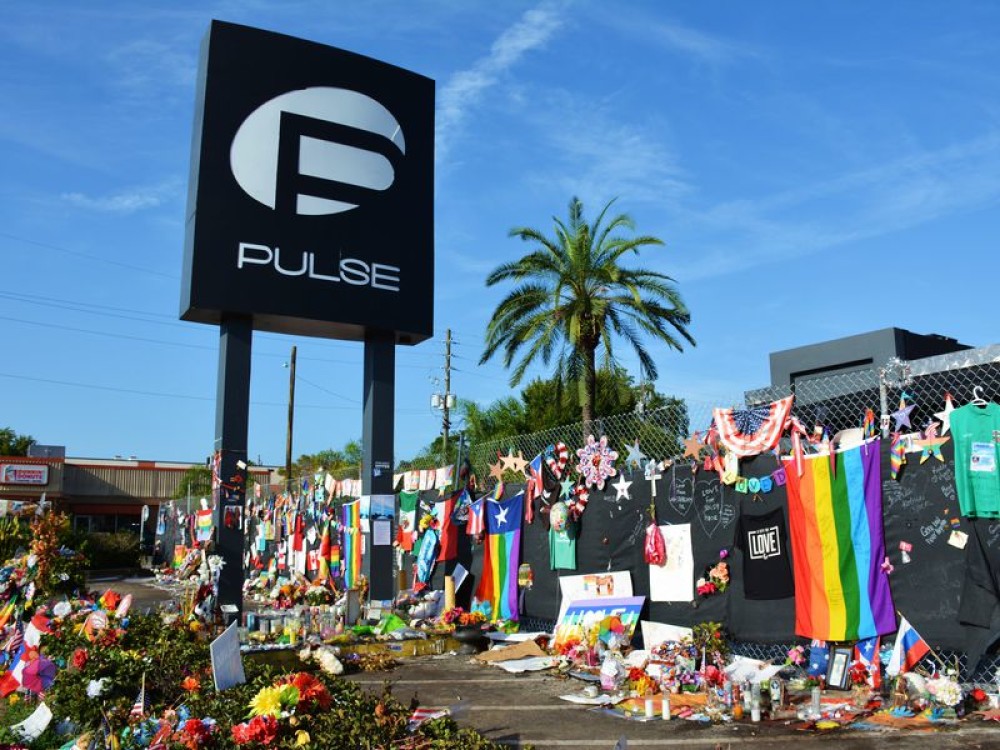Statement from Safer Warwickshire Partnership Board
In the wake of the atrocious events at a synagogue in Manchester, the partners of the Safer Warwickshire Partnership Board which includes Police, local...
Read more...Safer Warwickshire Partnership Board - In the wake of the atrocious events at a synagogue in Manchester... Read More

Three years after a gunman massacred 49 people and wounded many others at a gay nightclub in Orlando, Florida, the anniversary was being observed Wednesday (12th June 2019) with somber memorial gatherings.
In a proclamation, Florida Gov. Ron DeSantis ordered state flags to be lowered to half staff and asked Floridians to pause to remember the victims of the 2016 shooting at the Pulse nightclub.
Thousands of people have visited at the Pulse nightclub to pay their respects. Flowers, rainbow flags and personal items have been left to help those affected to remember the people who were tradgically killed in 2016.
For LGBT+ people, the biggest peacetime shooting in US history was both sign of the times and a frightening warning of what was still to come.
Louis Stables told the Independant he will ''never forget waking up three years ago. It was a Sunday morning and, in London anyway, it was sunny. Any hopes of a relaxing, lazy day were dashed, however, when I reached for my phone. A barrage of news notifications informed me that a gunman had opened fire at Pulse Nightclub in Florida, killing dozens of people''.
More details soon began to emerge: Pulse was an LGBT+ nightclub and the vast majority of victims were LGBT+ people of colour. I had only recently moved to London and, just a few hours previously, I had spent my Saturday night dancing at a gay club in Hackney. As the death toll quickly rose to 49, the deadliest mass shooting in US history at the time, I clutched my boyfriend’s hand and texted my parents to say I loved them.
Perhaps selfishly, I found myself thinking: “This could have been me”. But it wasn’t me. Thanks to the privilege of living in a country with sensible gun laws, I was still alive. Meanwhile, 49 LGBT+ people lay in a Florida morgue.
It's too easy to paint what happened in Orlando as a freak act of barbaric terrorism, which could never happen anywhere else. Pulse wasn't an isolated incident: it was both sign of the times and a warning of things to come.
Just a few weeks later, the UK voted to leave the European Union, causing a wave of hate crime to spread. According to Stonewall, one in five LGBT+ people has experienced a hate crime in the UK in the last 12 months. This number has risen further since the Brexit vote.
In America, Trump was elected just three months after the Pulse shooting, even winning the support of the majority of Florida’s voters. Towns that held a Trump rally saw a 226 per cent rise in hate crime.
Nationwide hate crime rose 17 per cent during his first year in office, and a fifth of these incidents directly referenced the president by name. In 2019, the average life expectancy of America’s black trans women is just 35.
The UK also experienced an increase in hate crime and LGBT+ people being affected. Official police statistics found that there has been a 56% increase of hate crime in West Midlands, but considering the number of unreported cases of hate crime that do not get reported to the police, hate crime is expected to be a much larger issue that the offical statistics suggest.
EQuIP, a Warwickshire based equalities charity, support victims of hate crime and they strongly encourage anyone that experiences and/or witnesses a hate crime/incident to always report.
Victims and/or witnesses can ring 101 in a non-emergency situation, but always call 999 in an emergency.
However, in Warwickshire, if you do not want to contact the police directly, you can report hate crimes/incidents to EQuIP online via the www.reporthatenow.com website, email advice@equipequality.org.uk or if you prefer to speak to someone in person, you can contact EQuIP on 01788 863117.
In the wake of the atrocious events at a synagogue in Manchester, the partners of the Safer Warwickshire Partnership Board which includes Police, local...
Read more...Hate Crime Awareness Week: A blog from Lionel Idan, CCP for London South | The Crown Prosecution Service view his blog here
Read more...On 7 June 2024, the 29-year-old defendant from Nuneaton, directed homophobic abuse towards a member of door staff at a licenced premise he was refused entry to.
Read more...